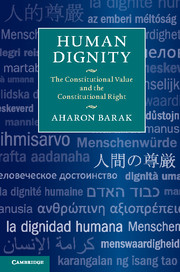Book contents
- Frontmatter
- Contents
- Preface
- Acknowledgements
- Table of Cases
- Part I Fundamental concepts and sources
- Part II Human dignity as a constitutional value
- 5 Purposive constitutional interpretation
- 6 The role of human dignity as a constitutional value
- 7 Three types of model for determining the content of the constitutional value of human dignity
- Part III Human dignity as a constitutional right
- Part IV Human dignity in comparative law
- Bibliography
- Index
- References
6 - The role of human dignity as a constitutional value
Published online by Cambridge University Press: 05 February 2015
- Frontmatter
- Contents
- Preface
- Acknowledgements
- Table of Cases
- Part I Fundamental concepts and sources
- Part II Human dignity as a constitutional value
- 5 Purposive constitutional interpretation
- 6 The role of human dignity as a constitutional value
- 7 Three types of model for determining the content of the constitutional value of human dignity
- Part III Human dignity as a constitutional right
- Part IV Human dignity in comparative law
- Bibliography
- Index
- References
Summary
Three roles of human dignity as a constitutional value
The constitutional value of human dignity has a central normative role. Human dignity as a constitutional value is the factor that unites the human rights into one whole. It ensures the normative unity of human rights. This normative unity is expressed in the three ways: first, the value of human dignity serves as a normative basis for constitutional rights set out in the constitution; second, it serves as an interpretative principle for determining the scope of constitutional rights, including the right to human dignity; third, the value of human dignity has an important role in determining the proportionality of a statute limiting a constitutional right. I shall briefly discuss each of these three roles.
Human dignity as a constitutional value that lays a foundation for all of the rights
The first role of human dignity as a constitutional value is expressed in the approach that it comprises the foundation for all of the constitutional rights. Human dignity is the central argument for the existence of human rights. It is the rationale for them all. It is the justification for the existence of rights. According to Christoph Enders, it is the constitutional value that determines that every person has the right to have rights. This does not mean that human dignity is the basic norm (Grundnorm) of the legal system. An important and fundamental constitutional value is one thing; a basic norm is quite another. The basic norm determines the binding nature of the constitution. This is unrelated to human dignity. Furthermore, it should not be automatically concluded that human dignity is the most important value that serves as a key to the solution of all difficult constitutional questions. Human dignity requires study and clarification, and each legal system must ultimately define its own position on this constitutional value.
- Type
- Chapter
- Information
- Human DignityThe Constitutional Value and the Constitutional Right, pp. 103 - 113Publisher: Cambridge University PressPrint publication year: 2015



